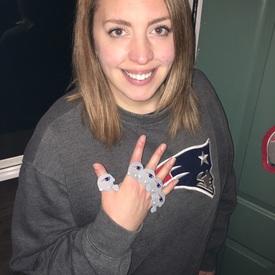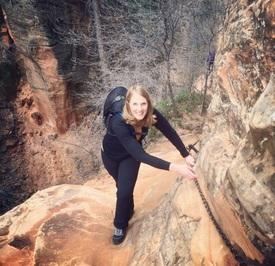Can we really know our calorie intake... really?
Options

AbbyPDX
Posts: 64 Member
So I enter "grilled skirt steak" into my food diary. About 30 skirt steaks come up. For 6 ounces anywhere from 300 calories to 700 calories. That is a very wide expanse. So you figure, you try to look at it and see... is it on the fattier side? Does it LOOK like the higher or lower number? Generally I shoot for somewhere in the middle. This happens with most meat (pork as well). But also grains like quinoa where the 'cooked 1/2 cup' can vary on MFP up to 100 calories.
I guess my question is, if we're supposed to be so particular about calories (I'm supposed to be eating 1700 calories. Not 1800 or 1900, not 1600 or 1500) how can I know if there's no genuine way to know what's in what I'm eating? I prefer to eat less packaged items that tell me the supposed calorie count on the back.
I guess my question is, if we're supposed to be so particular about calories (I'm supposed to be eating 1700 calories. Not 1800 or 1900, not 1600 or 1500) how can I know if there's no genuine way to know what's in what I'm eating? I prefer to eat less packaged items that tell me the supposed calorie count on the back.
0
Replies
-
And who knows how close they really come on writing all of that nutritional crap on the boxes? I think we make our best estimation.
And exercise. Sure, if you are walking, you can calculate distance and speed, or running you can do that, but with swimming, it lists effort as light, moderate and vigorous. So it's a guess.
I would even prick my finger for blood if there was a test to tell me if I had done good during the day.
Jan
"The water smells fear." by my son Jon, who is teaching me to swim.0 -
Don't sweat it too much. Also, you're getting a sneak preview of one of the benefits of eating similar food more often: simplified tracking.0
-
Funny this didn't get a lot of replies... I guess the answer is, "No, we can't really know. Good luck with that" :-)0
-
I try pointing that out to people all the time. You can be a diligent as you want in weighing and measuring but there is no way you are 100% accurate. That's why I don't sweat no being exactly on track - I use a no more than xxx and no less than xxx.0
-
"No, we can't really know. Good luck with that" :-)
Correct.
That's why sweating the exact numbers is pointless.
You know why it is so useful though? The act of recording makes us more aware about our choices on a daily basis, which causes us to reduce snacking, exercise better portion control, increase activity and so on.
All we can know is trends over time. Anyone who thinks it is an exact science is deluding themselves.0 -
Also, be wary of nutritional data provided by restaurants, of course. (hopefully we all know that!)
Example: let's say you splurge, get a whopper, and you log the NI per the company website.
How can we be sure that the burger has exactly the same amount of mayo, or the exact ounces of beef? Maybe they slab a little more mustard on theirs.
I think our best bet is to just use good judgement. Dont get me wrong, I love MFP and it is really seeming to help me along. We just gotta use our common sense!0 -
I usually look at the packages, even with meat, and then find the amount that is most accurate compared to the packaging0
-
You can't know exactly, down to the calorie. But there are database entries that are more accurate than others. Look for the ones with no asterisk, they've been checked against the USDA database. Speaking of the USDA, here's their website so you can double-check calorie counts:
http://ndb.nal.usda.gov/ndb/search/list
Always weigh meat raw and when you search for it put it in as "beef skirt steak raw" or whatever. That makes it more likely to give you the right entries. My meat has a nutrition label on it (it comes from the commissary butcher so I don't know if the regular grocery store does that or not) so I can double check it.
You're not going to get an absolutely completely accurate count. But you can take steps to get as close as possible, and then just understand that there's a margin of error.0 -
Can't remember where I read it, but nutrition information on food packaging can be off by as much as 20%. So a 100cal snack may only be 80 cals or could be 120 cals. Or a 1000cal meal can become a 1200cal meal. Everything is just an estimate. You do your best to get as accurate as possible, but it's always just an estimate.
Also, the different amounts listed on MFP are because people are using different brands, or including oils/butters/etc. so when in doubt and where possible, you should enter the information for yourself from the packaging you bought it in.
Like mfern123 said, the best help that tracking gives us is it enables us to spot trends in our eating patterns which are helping or hindering us 0
0 -
As long as your smart about what you log in, you should be ok. If you know you have a 6 oz skirt steak, that was cooked in butter its obviously not going to be on the lower end of the spectrum.0
-
But also grains like quinoa where the 'cooked 1/2 cup' can vary on MFP up to 100 calories.
With anything that comes dry and then you add water, always log the dry amount. I weigh my quinoa dry, in grams. Then I cook it. Because of the volume change it's kind of unpredictable to measure it cooked.0 -
"No, we can't really know. Good luck with that" :-)
Correct.
That's why sweating the exact numbers is pointless.
You know why it is so useful though? The act of recording makes us more aware about our choices on a daily basis, which causes us to reduce snacking, exercise better portion control, increase activity and so on.
All we can know is trends over time. Anyone who thinks it is an exact science is deluding themselves.
ITA.
I ran into this problem with fruit. What is small, med, large when it comes to oranges, apples, strawberries, etc.? Who knows, lol, unless you have a food scale and I don't and don't plan on getting one. But I've lost weight in the past 4 months so something must be working.0 -
So I enter "grilled skirt steak" into my food diary. About 30 skirt steaks come up. For 6 ounces anywhere from 300 calories to 700 calories. That is a very wide expanse. So you figure, you try to look at it and see... is it on the fattier side? Does it LOOK like the higher or lower number? Generally I shoot for somewhere in the middle. This happens with most meat (pork as well). But also grains like quinoa where the 'cooked 1/2 cup' can vary on MFP up to 100 calories.
I guess my question is, if we're supposed to be so particular about calories (I'm supposed to be eating 1700 calories. Not 1800 or 1900, not 1600 or 1500) how can I know if there's no genuine way to know what's in what I'm eating? I prefer to eat less packaged items that tell me the supposed calorie count on the back.
On meat, if I'm preparing it myself, there are some basic numbers for the raw food. Like chicken breast, for example. And depending on what/where you buy your meat, it might have calorie information on the label. so, I use that. and then I use the recipe feature on MFP to figure out how many calories are in my prepared dish/per serving. I try not to use data from other users that might be based on their best guesses or how they prepared it. You can tell user entered data because it has an asterick next to it. If you look up "skirt steak", and scroll, you will find one entry that does not have an asterick that is input by MFP for just the raw meat. I'd use that, and then be sure to add anything you might have used in preparation (olive oil, etc).0 -
Everything is an estimate. We know our calorie intake and output is in balance (or out of balance) generally by how the scale moves. If it stays, you're eating about the right amount to maintain your weight. If it's going up, cut back. If it's going down, that's great if you're intending to lose weight, so keep it up.
Even the 3,500 cals = a pound of fat equation is merely a generalized estimate. So are nutritional labels and laboratory test results. A strawberry grown in nutrient rich soil may have more (delicious) calories than one that isn't.
We can't sweat this. Do the best you can. It's all an average anyway.0 -
You do what you can, basically. It's not an exact science, and it doesn't need to be.0
-
I love my food scale.0
-
With steak you have to know the cut of the meat to get a guestimate of the fat%. However, it is still just a guestimate.
My advice would be to choose one and then always use that choice when you eat that product.
With quinoa, buy some scales. Weight is more accurate than cups imo.0 -
i ask myself the same thing haha. usually i just opt for the higher cal option, i figure it's better to overshoot than undershoot!So I enter "grilled skirt steak" into my food diary. About 30 skirt steaks come up. For 6 ounces anywhere from 300 calories to 700 calories. That is a very wide expanse. So you figure, you try to look at it and see... is it on the fattier side? Does it LOOK like the higher or lower number? Generally I shoot for somewhere in the middle. This happens with most meat (pork as well). But also grains like quinoa where the 'cooked 1/2 cup' can vary on MFP up to 100 calories.
I guess my question is, if we're supposed to be so particular about calories (I'm supposed to be eating 1700 calories. Not 1800 or 1900, not 1600 or 1500) how can I know if there's no genuine way to know what's in what I'm eating? I prefer to eat less packaged items that tell me the supposed calorie count on the back.0 -
All we can know is trends over time. Anyone who thinks it is an exact science is deluding themselves.
BINGO0 -
I love my food scale.
But even with weighing foods it still depends on the values given by the Atwater system which is far from perfect.
What weighing does is give you consistent portions - and it is consistency which is the key.
One of the biggest advantages of calorie counting - flexibility - can also be one of its biggest disadvantages - increased margin of error.
Like Zen man.0 -
No, we can't. Even nutrition facts on packaged foods are not always accurate. And restaurants certainly aren't.
It's more about mindfulness than exact numbers.0 -
Yes. Weigh your food.0
-
This is a good video to watch in regards to nutritional information and how not-so sure we can be about it.
http://youtu.be/hE2lna5Wxuo
In short it is a study about foods using a calorimeter machine and lots of math to best estimate how off the nutritional values are. Keep in mind these values are not heavily monitored by the FDA to be correct only that the product has them.0 -
Short answer - No, we can't.
Long answer - like finishes on natural products, there is a get-out clause to say that the finish won't be consistent. Food is the same - it's a natural product and won't be consistent. Unless of course you eat mass produced synthetic crap, in which case you wouldn't be reading this......0 -
Thanks all for your thoughts. I do weigh my food but was saying even for "1/2 cup quinoa" I see different calorie counts for dry on here. I guess I need to start taking a pen and paper to the grocery store and writing the content off the bulk section (where I buy the majority of my grains). I do weigh my steak, but my point was that there are different cuts and even within that cut some are fattier/denser than others so you can't know for sure.
I guess this was a little bit of a sarcastic push at those who tell me they eat "1557 calories a day" and I'm thinking... come on.
I log everything, tend to over estimate instead of under estimating and generally still presume I'm at least 100 cals over whatever I logged. Thanks!0 -
I guess I need to start taking a pen and paper to the grocery store and writing the content off the bulk section (where I buy the majority of my grains). I do weigh my steak, but my point was that there are different cuts and even within that cut some are fattier/denser than others so you can't know for sure.
That's exactly what I do in RE to the grains, etc. For meats I just do my best...I get a lot of my meat at Costco and it has nutritional info on their packages so I just go with that, but it's never going to be exact. None-the-less, I've had a great deal of success. Biggest thing for me was just learning proper portion size and portion control.0 -
Unless you weigh your food to the gram and know precisely what ingredients were used in preparation, no. But there are plenty of food where an estimate is a safe bet.0
-
...You know why it is so useful though? The act of recording makes us more aware about our choices on a daily basis, which causes us to reduce snacking, exercise better portion control, increase activity and so on...
I totally agree here ^^.0
This discussion has been closed.
Categories
- All Categories
- 1.4M Health, Wellness and Goals
- 396.9K Introduce Yourself
- 44.2K Getting Started
- 260.9K Health and Weight Loss
- 176.3K Food and Nutrition
- 47.6K Recipes
- 232.8K Fitness and Exercise
- 452 Sleep, Mindfulness and Overall Wellness
- 6.5K Goal: Maintaining Weight
- 8.7K Goal: Gaining Weight and Body Building
- 153.3K Motivation and Support
- 8.3K Challenges
- 1.3K Debate Club
- 96.5K Chit-Chat
- 2.6K Fun and Games
- 4.5K MyFitnessPal Information
- 16 News and Announcements
- 18 MyFitnessPal Academy
- 1.4K Feature Suggestions and Ideas
- 3.1K MyFitnessPal Tech Support Questions





















